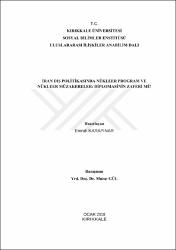| dc.contributor.advisor | Gül, Murat | |
| dc.contributor.author | Karapınar, Emrah | |
| dc.date.accessioned | 2021-01-16T18:55:07Z | |
| dc.date.available | 2021-01-16T18:55:07Z | |
| dc.date.issued | 2018 | |
| dc.identifier.uri | | |
| dc.identifier.uri | https://hdl.handle.net/20.500.12587/14466 | |
| dc.description | YÖK Tez ID: 531581 | en_US |
| dc.description.abstract | Nükleer program, Şah yönetimi döneminde İran'ın önemli önceliklerinden biriydi. İran'da gerçekleşen İslam Devrimi sonrasında da her ne kadar dini ve ekonomik nedenlerden dolayı nükleer programda kısa süreli bir duraksama yaşanmış olsa da yeniden İran'ın önemli önceliklerinden biri olmuştur. Fakat uluslararası arenada dengelerin kendi aleyhine bozulmasını istemeyen ABD ve müttefikleri nükleer teknolojinin askeri boyutu nedeniyle eski müttefik İran'ın nükleer programını bir tehdit olarak görmüş ve İran'a bu konuda uluslararası baskı uygulamaya başlamıştır. Bu durumun üstesinden gelmek isteyen İran ise gizli nükleer faaliyetlere yönelmiştir. 2002 yılında İran'ın gizli nükleer faaliyetlerin gün yüzüne çıkmasıyla birlikte İran ve ABD arasında, kısa sürede IAEA, AB, BM, Rusya ve Çin gibi önemli aktörlerin de dahil olduğu, nükleer kriz ortaya çıkmıştır. Söz konusu kriz İran için bir beka sorunu haline gelmiştir. Dolayısıyla da İran'ın nükleer programa, nükleer krize ve nükleer müzakerelere yönelik izlediği politika İslam Devrimi sonrası İran dış politikasının en önemli sınavlarından biri olmuştur. Ayrıca krizle birlikte diplomasinin etkinliğinin gösterilmesi için bir fırsat alanı da oluşmuştur. Bu çalışma, İran'ın nükleer programını, program nedeniyle ortaya çıkan krizi ve krizin çözümüne yönelik müzakereleri analiz etmektedir. İran'ın nükleer programını geliştirmesindeki en önemli amaçlarından biri dış politikasını güçlendirmektir. İran için bir beka sorunu haline dönüşen kriz ise İran tarafından uluslararası topluma varlığını ve etkinliğini ispat etmek için bir fırsata dönüştürülmüştür. Ayrıca, bu kriz özelinde ortaya çıkan durum da diplomasinin kriz yönetimi ve çözümünde etkili bir alternatif olduğunu ortaya koymaktadır. Anahtar Sözcükler: İran, zorlayıcı diplomasi, yaptırım, ABD, AB, nükleer silah, BM Güvenlik Konseyi. | en_US |
| dc.description.abstract | The nuclear programme was one of Iran's important priorities during the Shah administration. Although there was a short-term hesitation at the nuclear programme because of the economic and religious reasons after the Islamic Revolution, it has become again one of the important priorities of Iran. However, USA and its allies that did not want a change against themselves disturbing the prevailing balance at the international arena, considered the nuclear programme of Iran, an old ally, because of the military dimension as a threat and started to exercise international pressure against Iran on this issue. Iran, which wants to overcome this situation, engaged in secret nuclear activities. With the emergence of Iran's secret nuclear activities in 2002, a nuclear crisis emerged between Iran and USA, and then important actors such as IAEA, EU, UN, Russia and China soon intervened in this crisis. This crisis has been a survival problem for Iran. Therefore Iran's policy towards the nuclear programme, the nuclear crisis and the nuclear negotiation has been the one of the most important exams of Iran's foreign policy after the Islamic Revolution. Moreover, with the crisis, an opportunity field emerged to show up the effectiveness of the diplomacy. This study analyzes Iran's nuclear programme, the crisis caused by the programme and the negotiations for resolving the crisis. One of the most important aims of Iran in developing its nuclear programme is to strengthen its foreign policy. The crisis that turned into a survival problem for Iran has been returned into an occasion by Iran to prove its existence and its effectiveness to international community. Also, the situation that emerged in this crisis sests forth that diplomacy is an effective alternative to crisis management and solution. Key Words: Iran, coercive diplomacy, sanction, USA, EU, nuclear weapon, UN Security Council. | en_US |
| dc.language.iso | tur | en_US |
| dc.publisher | Kırıkkale Üniversitesi | en_US |
| dc.rights | info:eu-repo/semantics/openAccess | en_US |
| dc.subject | Uluslararası İlişkiler | en_US |
| dc.subject | International Relations | en_US |
| dc.subject | | en_US |
| dc.subject | | en_US |
| dc.subject | | en_US |
| dc.subject | | en_US |
| dc.subject | | en_US |
| dc.subject | | en_US |
| dc.subject | | en_US |
| dc.subject | | en_US |
| dc.title | İran dış politikasında nükleer program ve nükleer müzakereler: Diplomasinin zaferi mi | en_US |
| dc.title.alternative | The nuclear program in Irans's foreign policy and nuclear negotiations: Victory of diplomacy | en_US |
| dc.type | masterThesis | en_US |
| dc.contributor.department | KKÜ, Sosyal Bilimler Enstitüsü, Uluslararası İlişkiler Anabilim Dalı | en_US |
| dc.identifier.startpage | 1 | en_US |
| dc.identifier.endpage | 166 | en_US |
| dc.relation.publicationcategory | Tez | en_US |
















